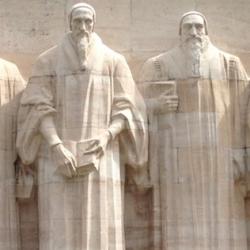Belden Lane knows that his thesis is surprising. In fact, the word “surprising” appears in the subtitle of his 2011 Ravished by Beauty, a study of Reformed spirituality’s “surprising legacy.”
Neither ravishment nor beauty fits the stereotype of Reformed Christianity. But Lane says that both are central to Reformed spirituality from Calvin to Edwards.
The beauty that ravishes is ultimately the beauty of God, and Reformed theology has developed “an extraordinarily passionate, personal, and at times highly erotic longing for God in Reformed piety” (24), often in allegorical riffs on the Song of Songs. Calvin himself “relished spousal imagery, as Puritans after him would do, speaking of ‘that sacred wedlock through which we are made flesh of his flesh and bone of his bone, and thus one with him.’ Following his lead, Puritans from Francis Rous and Richard Sibbes in England to John Cotton and Edward Taylor in New England rang all the changes on the erotic language of the Song of Songs. They described spiritual devotion as a matter of ‘lusting’ after Christ as bridegroom. They pictured the heart as a marriage bed prepared for the divine lover. The language of foreplay and orgasm became as common in Puritan preaching as anything found in the bridal mysticism of Bernard of Clairvaux or Mechthild of Magdeburg and Teresa of Avila” (24).
But the beauty that ravishes is not only God’s own eternal beauty. Lane discerns in Reformed spirituality a delight in God’s creation: “We don’t usually think of Calvin as an exponent of ‘creation spirituality,’ yet in a rare excess of language, he could go so far as to say that ‘nature is God’ in recognizing the degree to which the cosmos is utterly filled with God’s glory. He celebrated the divine presence in the created world to such an extent that his language could almost slide into pantheism. Jonathan Edwards pushed the same edges in using the Platonic language of emanation to describe God’s relation to the world. He spoke of God’s glory as a refulgence that fl ows from the divine being into the world and back again to its luminary. . . . The Reformed tradition has persistently discerned God’s glory filling the earth, even as it warns that God’s being is never contained by anything within it. A panentheist amazement lies close to its heart” (25).
Given the stereotypes, a surprising thesis. And a necessary one.











